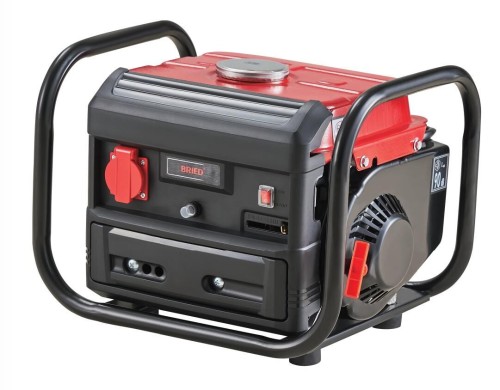
Your ultimate solution for power shortages is here. As a leading international gasoline generator exporter, Zhejiang Bried Machinery & Electric Co., Ltd offers a wide range of export-quality portable gasoline generators designed for diverse needs. Our generators vary in engine size, tank capacity, and voltage range, ensuring compatibility with applications like construction sites, outdoor events, and emergency power supply. Whether you need an industrial gasoline generator exporter for heavy-duty operations or a compact unit for domestic use, our portable, reliable, and efficient solutions guarantee uninterrupted electricity. Businesses worldwide trust us as their gasoline generator exporter to avoid downtime, prioritizing safety, comfort, and performance.
As a premier petrol power generator manufacturer and supplier, Zhejiang Bried Machinery & Electric Co., Ltd specializes in tailored power solutions. Customize your order by selecting power levels, tank sizes, and branding options through our OEM generator export services. We adhere to regional standards and environmental regulations, ensuring user safety and global compliance. Our technical customization eliminates over- or under-powering, delivering optimal performance for both industrial and residential needs. Partner with us for international generator export logistics expertise, guaranteeing seamless delivery and compatibility across markets.
Explore our gasoline generator factory offerings, equipped with high-quality components:
✔ Lightweight design with high power output and large tank capacity.
✔ Overload protection to prevent internal damage.
✔ Smooth startup for safe voltage flow.
✔ Cord and ignition options for convenience.
✔ Easy maintenance for small portable gas generators.
✔ Wheels and rubber-coated handles for portability.
✔ Vibration dampers reduce noise and ground impact.
✔ Low-oil auto-stop alerts for safety.
As a trusted wholesale gasoline generator supplier, we combine affordability with durability. Our streamlined supply chain and bulk-order efficiencies allow us to offer competitive pricing without compromising quality. Leverage our global generator distribution network to access generators with low MOQs, which is ideal for commercial buyers. Recognized in leading international gasoline generator exporter rankings, we ensure reliability for emergency backup, construction, or events.
We don’t outsource or resell; all of our gasoline generators are built in-house at our own factory in Zhejiang, China. This means full control over quality, safety, and performance. From engine assembly to safety testing, every unit passes through hands-on inspections before it's shipped. Our facility is equipped to handle both custom OEM orders and bulk production, making sure you get consistent results every time.
We know not every business wants to commit to massive orders upfront. That’s why we offer flexible options for bulk orders with reasonable minimum quantities. Whether you're starting a new product line or managing regular stock, we make the process simple. Our team helps you choose the right models and quantities, and we handle the export logistics so you get what you need, when you need it.
We export gasoline generators to businesses across Europe, Asia, South America, and Africa. Every unit comes ready with the certifications you need, like CE, EPA, or GCC, depending on your market. Our team has handled international shipments for years. We know what paperwork you need, what specs each region requires, and how to make sure your order clears customs without a problem.
Our customers use these generators everywhere, powering tools on construction sites, keeping lights on during power cuts, or running sound systems at outdoor events. Whether you're in agriculture, telecom, events, or emergency services, we can match you with the right unit. We help you avoid underpowered or oversized machines by making sure your choice fits your exact use case.
Most portable generators are designed to run on regular unleaded gasoline (87 octane) with up to 10% ethanol; avoid using high-ethanol blends such as E85, which can damage the fuel system.
Refer to your owner’s manual for any specific fuel-grade requirements or prohibitions.
Natural gas typically costs about $1.88 per hour of operation, roughly half the $3 per hour (or more) you’d spend on gasoline at current fuel prices.
Availability, hookup fees, and local utility rates affect your overall cost comparison.
For short-term storage (up to a few months), leaving stabilized fuel in the tank and shutting off the valve is acceptable if you periodically dry the carburetor.
For more extended storage (over six months to a year), it’s best to drain all gasoline to prevent gum and varnish buildup.
Brand affects build quality, voltage regulation, noise levels, warranty support, and parts availability more than just the power rating.
Well-established manufacturers often invest in better engine tuning and safety features, which can extend service life.
Many Chinese “clone” generators now deliver thousands of trouble-free hours when properly maintained, but quality can vary significantly between manufacturers.
If you choose a Chinese model, look for reputable resellers, user reviews, and a solid parts/service network.
Portable generators typically last 2,000–5,000 hours of run-time with regular maintenance; standby systems can accumulate 3,000 hours and may serve reliably for 20–30 years.
Actual lifespan depends heavily on load management, oil change intervals, and operating environment.
Technically, yes, but most manufacturers recommend shutting down every 8–24 hours for oil checks, cool-down, and routine inspections to prevent overheating and wear.
Continuous operation without breaks can drastically shorten engine life and increase the risk of mechanical failure.